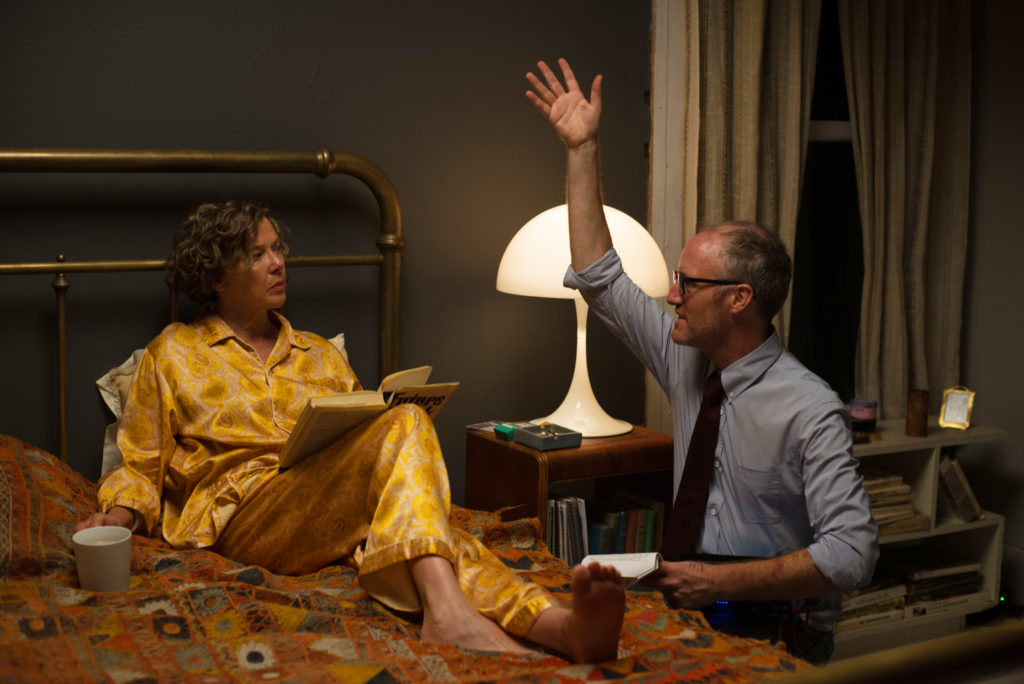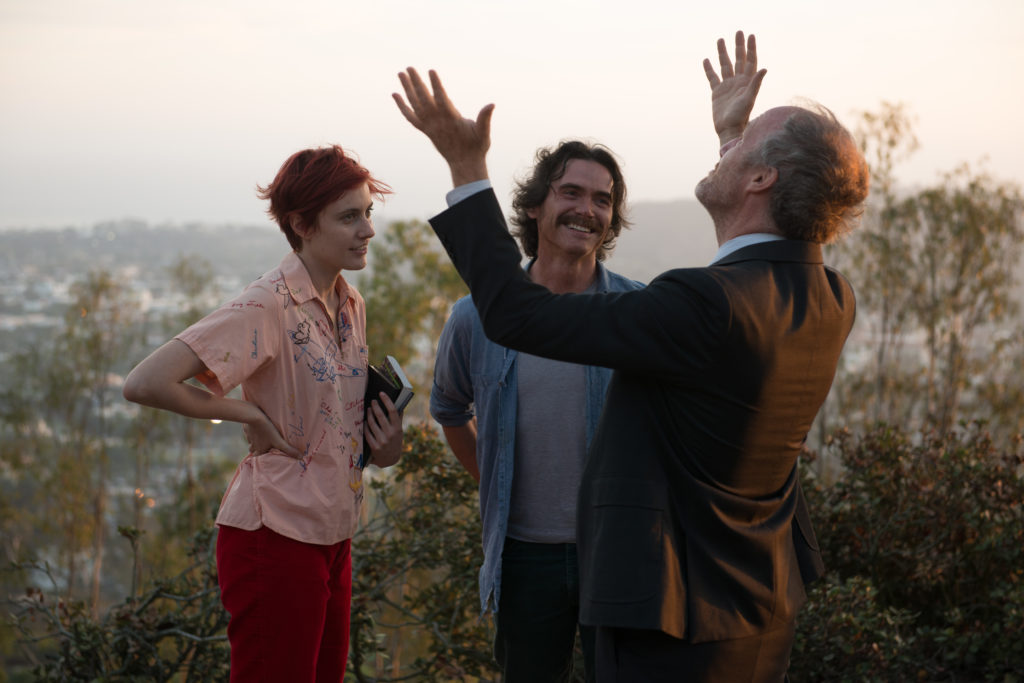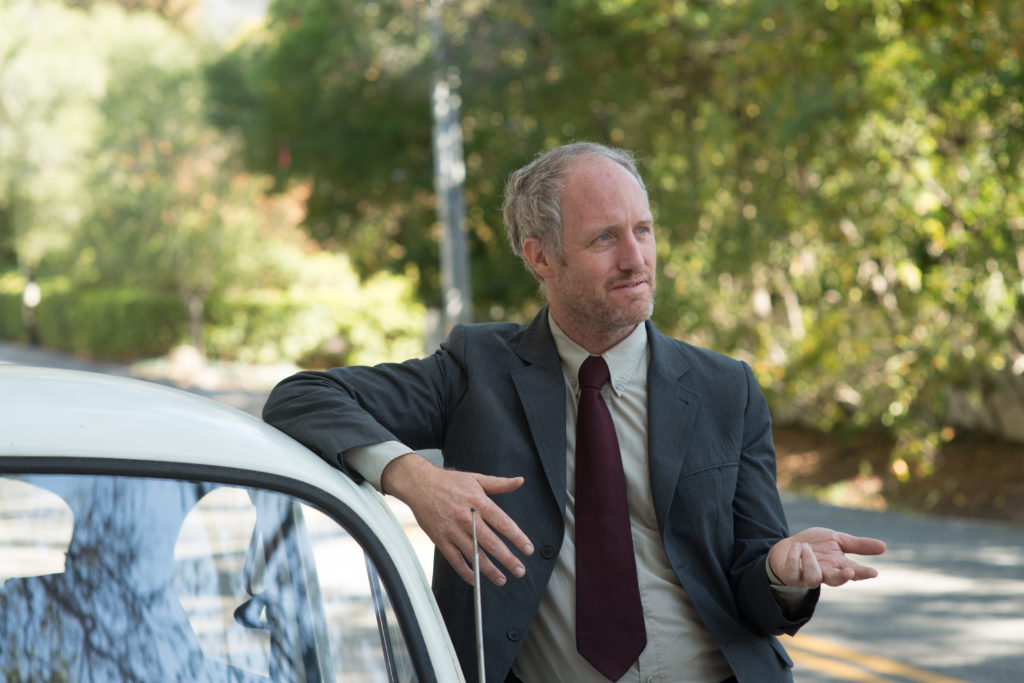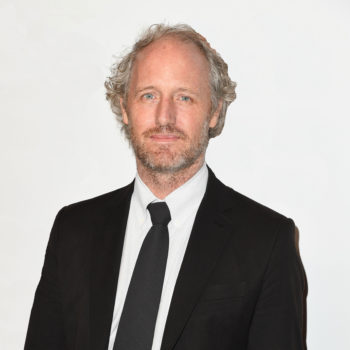Director Mike Mills got his start in the music biz — making videos for acts like Air and Moby, and designing posters for The Beastie Boys. But he’s probably best known for his feature film “Beginners” — which earned it’s star Christopher Plummer an Academy Award.
That movie was based on Mills’ Dad. And his latest, “20th Century Women,” is about his Mom. It stars Annette Bening as Dorothea, an older single mother circa 1979. She asks a punk photographer, played by Greta Gerwig, and a jaded teen, played by Elle Fanning, to teach her son about being a modern man.
When Brendan met with Mills, he kicked things off by asking him to describe his mom.

Mike Mills: My mother was a completely unusual, iconoclastic woman. Didn’t do anything that a woman should be doing at the time — you know, had short hair, wore pants. If you want a real quick rundown on my mom, just put together Humphrey Bogart and Amelia Earhart, but lean a little bit more towards Humphrey Bogart, you know?
She had me when she was 40. So, there she is, as a middle-aged woman, as a 55-year-old woman, raising this teenager in Santa Barbara who’s into punk rock and skateboarding and feelings and emotional life. And we make, like, a great odd couple. We make, like, a crazy contrast.
Brendan Francis Newnam: Well, it’s interesting because your mother, as you describe her and as she’s depicted onscreen by Annette Bening, is, on the one hand, emotionally reticent, and on the other hand, she’s a free spirit who writes her son fake notes to get him out of school. Tell me a little more about that interesting blend.
Mike Mills: And Annette Bening loved these contradictions, and Annette Bening had the emotional intelligence to really play with them and see them as the fuel of her performance. So, my mom…you know, people born in the ’20s, they grew up watching films all the time during the ’30s and ’40s.

And if you think about female characters in films from that time, they are funny and sarcastic and empowered and subversive and have a lot of bandwidth. You know, they can really go all over the place. And it’s also, my mom had a really beautiful anti-authoritarian streak with a sort of socialist tinge. And if you’re a teenager in the Depression, I think there’s a lot of that coming at you from American culture.
Brendan Francis Newnam: Dorothea is just one of the “20th Century Women” of the title. There’s Abbie, who’s this punky, free-spirited boarder played by Greta Gerwig, and Julie, played by Elle Fanning, the childhood friend of Jamie. How did you go about working up these characters? Because, as a man, you have inherent limitations in writing these young women.
Mike Mills: Yeah, inherent limitations and a real need to see them all the time, right, and to accept my outsider-ness, and to the lived experience of a woman.
So, I interviewed a lot of women. And Abbie is based a bit — a lot, a good amount — on my real sister’s experience of going to New York, finding herself, went to Parsons, found photography, found a more active, alive, empowered version of female sexuality, you know? And then, did get cervical cancer and had to come home to, like, her small town, Santa Barbara. And sort of like, have her life exploded and have to start over with the thought that she might not be able to have kids.
And so, my sister very generously gave me that part of her life, gave me that story, and I interviewed her a lot. And Greta interviewed her on her own, without me there, sort of more woman-to-woman. And told me some amazing things that I didn’t quite learn. And Greta and her, just being woman-to-woman, had a really different conversation, and I really love that that happened, and it really fed the role.
Brendan Francis Newnam: Yeah, what was one of those things to make it to the film? Can you remember one?
Mike Mills: There’s a great moment in the movie where Greta’s talking about [how] Abbie moved to New York, and this thing of like, she learned how to be sexual in a way that she found empowering and that really came out of a conversation between those two women, who — I adore both of them… and Greta’s a great writer and director, right? Greta’s a real, you know, full, complete artist person. And I’m always trying to engage the actor as much as I can on all levels. So, I was like, “Greta, can you just that up or memorize it or just put it in your own words? And I want to put it right here in my story and, just on that day, just know I’m going to ask you to tell your version of what you’ve learned.”
And it’s one of my favorite little moments in the movie, and Greta did an amazing job of bringing that to life. It feels so, like, just she’s telling her story.

Brendan Francis Newnam: One of the other characters in the movie is the year 1979, and it appears through music, through archival photos and the attitudes of the character. Why select that year to place this movie?
Mike Mills: Well, because I’m starting from personal material and my life, it makes basic sense for my life. That’s basically the age I was. And I needed my Depression-era mom to be raising this punk rock kid, right? So, you’re in one of the late ’70s years.
And I didn’t want to make a nostalgic movie. I wanted it to be very accurate to the time, but I feel like 1979, in a weird way, is the beginning of now in so many different ways. The Talking Heads are very heavily featured in my film, both musically and as, like, a cultural moment. They are so relevant and influential and alive right now: their music and their inventions, and even David Byrne as a model of a man. And as a version of a straight man. I think he has a tremendous amount of currency right now as a viable working model of how to be a decent guy, you know? And that’s really interesting to me.
And then, just everything from the oil crisis to the Islamic Revolution to the birth of home computing to the transition from Carter to Reagan, there’s just so many weird echoes to now. So, I like that, and I exploited it. It wasn’t why I picked then, but it was my way of talking about then, as constantly how to relate it to now.
Brendan Francis Newnam: Well, one of the things I really like about this movie is the writing. I think it’s really strong. The dialogue is great, but one of my favorite parts of your writing are these succinct phrases that kind of capture a life lesson. They’re almost like these zen quotes. I have a bunch of them written down.
One of them is, quote, “Wondering if you’re happy is just a shortcut to being depressed.” Another is, “It’s hard, but then it gets better, but then it gets hard again.” And I could go on. My question is: are these quotes from your mother, or are these quotes that have just emerged during your life, that you kind of jot down in a notebook, and then you write around them? How’d they come?
Mike Mills: Well, it’s a kind of a combination of things, and my scripts do take two or three years, right? And a lot of life happens in two or three years. I don’t go around writing in a notebook, like “Mike’s Pithy Thoughts on the World to Put into a Movie.”
Brendan Francis Newnam: Disappointing.
Mike Mills: [Laughs.] But half those things you just mentioned are my attempt to really understand and make a portrait of my mom. You know, my mom would say stuff like that. It’s very much my mom’s worldview, and there’s other things that I did.
I became a father midway through my writing process, and it was really interesting to get to use my mom — this fictional character based on my mom — as a… whatever you want to call it — a voice for me to say my own stuff about being a parent. And she has a line she says to Greta Gerwig’s character, “You get to see him out in the world as a person. I never will,” as his mother.
And that really came from being a dad and watching my little boy go off to preschool and into the arms of someone else, and then watching — you know, he couldn’t see I was watching, and I had left, but I was still watching, and he was kind of different, you know? Like, his gestures, the way he was talking to people. And I was like, “Oh, wow, this is how it’s going to be, huh?” And I went home and wrote that line. So, it was yet another weird gift my mom has given me in that this character let me talk about being a parent on my own.

Brendan Francis Newnam: And, in many ways, Dorothea recognizing and trying to come to terms with the fact that James is a different person is a major theme in the movie.
Mike Mills: Yeah. As a son and then, as a writer who’s trying to inhabit the position of the mother, which is a trip. This theme kind of kept coming up to me, which is: as interwoven as me and my mother are, were, right, we were once one body, right?
And as much as I dearly love her, and as much as she is really just the mountain in my horizon line that I orientate towards, there’s key things that I can never understand about her. There’s key things that will always remain out of my grasp. And same for her towards me. And maybe that’s an unspoken, not often talked about part of the contract of being a parent and a child, that it’s really hard to understand, and central and bittersweet would be putting it lightly.
Brendan Francis Newnam: Yeah. So, your wife is the writer and director Miranda July, who we’ve had on the show a couple of times. She is a strong 20th and 21st-century woman. And I wonder, did you consult her while making this movie?
Mike Mills: We try to keep our work lives…we met as adults and we work in very different ways, and we try to keep it to a minimum. And we’re very supportive to each other but not, like, in the nitty-gritty, what we’re working on. Because, ultimately, that’s a very personal, private journey, you know?
But Miranda did read the script once and was very key — like, had some really amazing insights to it, and she saw my edit once in a real pivotal moment and was also really super insightful. She’s amazing at story. But maybe more importantly than both those answers is I am constantly wanting to impress Miranda.
It’s like, you know, when you’re first dating someone, right, and you make a mixtape, and you spend three days on it because you really want to impress them. So, I spent, like, five years on my movie, partly because I really want to make Miranda fall in love with me all over again.
[This interview has been edited and condensed.]


